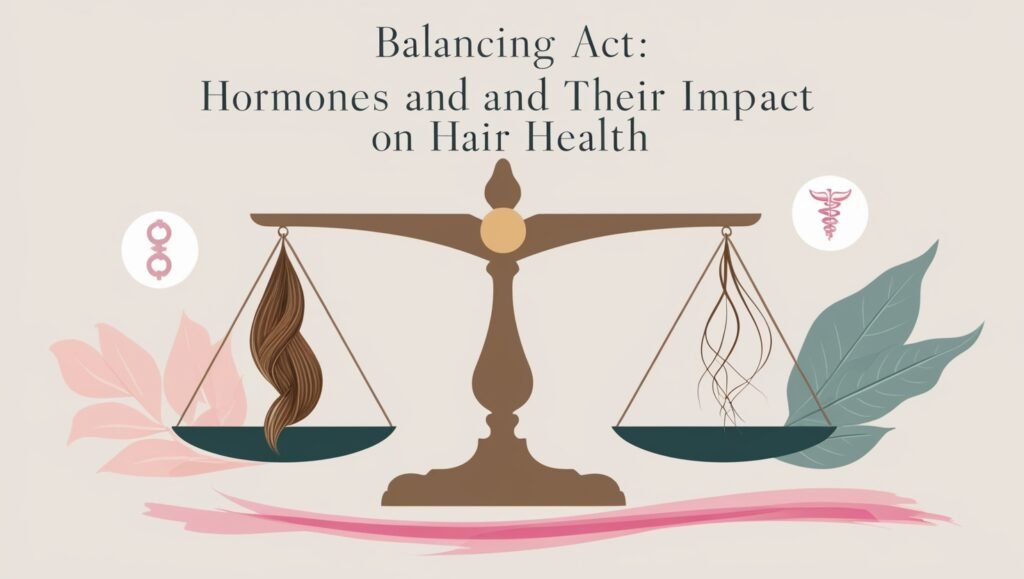Balancing Act: Hormones and Their Impact on Hair Health

Hormones play a huge role in our hair’s overall health and appearance. They can influence how fast or thick our hair grows and even contribute to hair loss in certain situations. For many people, hormonal changes caused by stress, lifestyle changes, or certain life stages can lead to noticeable changes in their hair. By understanding how hormones work and their impact on hair, we can take steps to manage these effects and keep our hair healthy.
Hormonal Changes Throughout Life Stages
Hormonal shifts happen throughout life, especially during significant life stages. During puberty, for example, hormones like androgens increase, which affects hair growth in new areas and changes hair texture and color.
For women, hormones can have a particularly strong impact during pregnancy and menopause. Pregnancy usually brings higher levels of estrogen, which often makes hair appear thicker and more vibrant. However, after childbirth, estrogen levels drop, which can result in postpartum hair shedding. Menopause also involves a decrease in estrogen, leading to hair thinning or even hair loss in some women. These stages demonstrate how closely our hair health is tied to hormonal changes.
Monthly Hormonal Fluctuations and Hair Sensitivity
In addition to life stage changes, women experience monthly hormonal fluctuations due to the menstrual cycle. Just before menstruation, hormone levels can shift, causing changes in hair texture and strength. Hair may become more vulnerable to breakage or appear less vibrant during these times. This monthly cycle shows how delicate the balance of hormones needs to be to support healthy hair growth.
Key Hormones Influencing Hair: Testosterone and Estrogen
The two main hormones that directly affect hair growth are testosterone and estrogen. Testosterone boosts the activity of hair follicles, which can lead to thicker hair in some areas, but if imbalanced, it may cause thinning in others. Estrogen, on the other hand, has a calming effect, helping to slow down hair growth in certain regions and generally supporting hair thickness.
When testosterone levels rise, hair may grow faster but also fall out quicker, leading to thinning over time. Estrogen helps to stabilize this process, ensuring a steady and manageable hair growth cycle. But when estrogen levels drop, hair can become thinner and more brittle. Cortisol, the stress hormone, should also be kept in check to maintain balance as it influences both testosterone and estrogen.
Scientific Findings on Hormones and Hair Loss
Research sheds light on how hormonal imbalances contribute to hair loss. For instance, studies from Normus et al. at Hair University found that women with polycystic ovarian syndrome (PCOS) and higher-than-normal testosterone levels often experience premature hair thinning. Another study revealed that hormone replacement therapy in post-menopausal women helped reduce hair loss by stabilizing estrogen levels.
These studies show that managing hormone levels is essential to maintaining healthy hair, especially for individuals with certain hormonal conditions.
Tips for Preventing Hair Damage During Hormonal Changes
While hormones can impact hair health, there are several things we can do to protect our hair, even during times of fluctuation:
- Avoid Harsh Hair Treatments: Limit the use of chemical treatments like bleaching, perming, or straightening, as these can weaken hair, making it more vulnerable to breakage during hormonal changes.
- Be Gentle with Your Hair: Use a wide-tooth comb and avoid rough handling, especially when hair is wet and more prone to breakage.
- Increase Protein Intake: Hair is primarily made of protein, so eating protein-rich foods like eggs, fish, and beans can support strong hair growth.
- Consider Medicated Shampoos: If hormonal changes significantly impact your hair, using medicated shampoos or other topical treatments designed to strengthen hair can help protect against thinning.
- Manage Stress: Since cortisol (the stress hormone) can affect hair health, managing stress through activities like yoga, meditation, or deep breathing can help keep hormone levels balanced.
By making these adjustments to your hair care routine, you can reduce the impact of hormonal changes and promote healthy hair growth.
Conclusion: Maintaining Healthy Hair Through Hormonal Shifts
Hormonal changes are a natural part of life, but with a bit of care and attention, you can maintain healthy, strong hair. Learning about how hormones influence hair health helps us make informed choices to protect and nurture our hair. By balancing hormone levels, eating well, and avoiding harsh hair treatments, we can support hair health through every stage of life.
Remember, healthy hair doesn’t just depend on the products you use; it’s also influenced by your overall well-being. A few small changes in your lifestyle and hair care routine can make a big difference in how your hair looks and feels, helping you to feel confident no matter what hormonal changes come your way.
